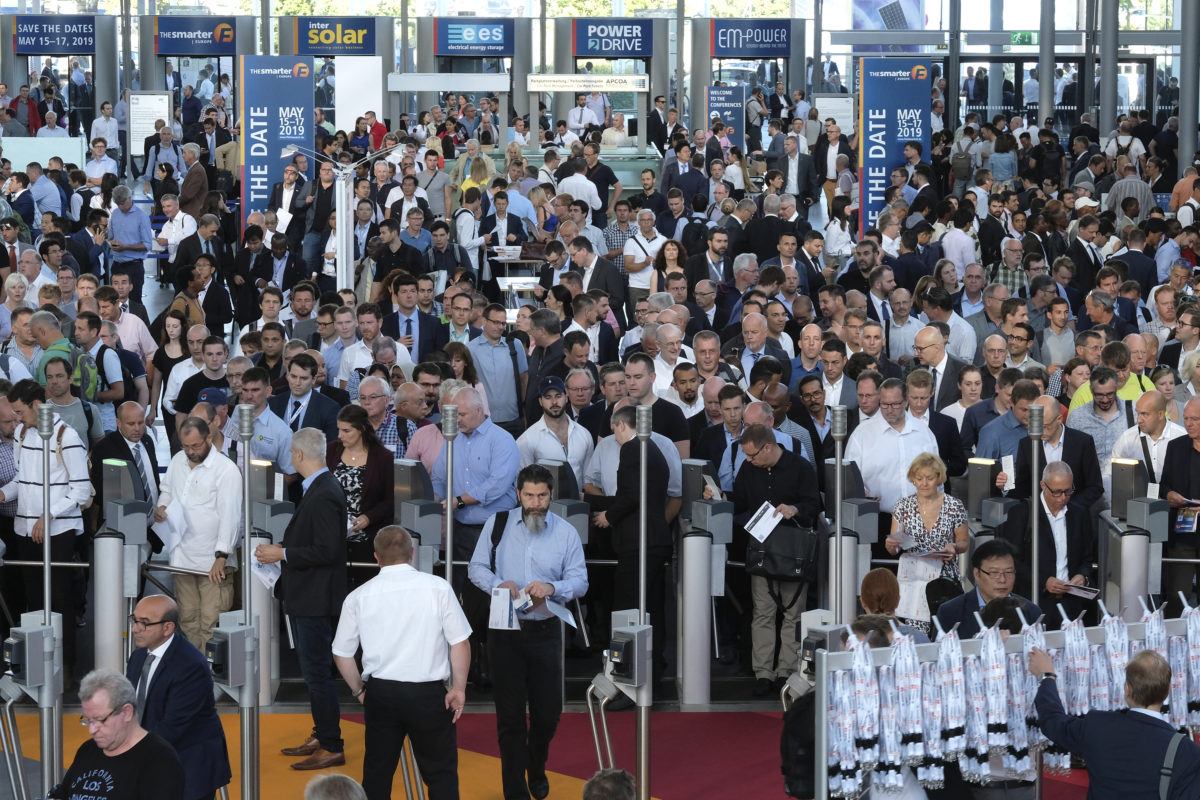At the Indo-German Energy Dialogue on Solar PV Market Development in India – held yesterday at the Smarter E/Intersolar Europe event in Munich – Shri Anand Kumar underlined India’s commitment to a low carbon world.
The nation will become the number one renewable energy market in the future, said the MNRE secretary, adding the nation has huge opportunities in solar and wind.
Revised targets
At the beginning of June, the government announced it would revise its already ambitious 175 GW solar target upwards to 225 GW of installed capacity by 2022. “We will comfortably cross the 200 GW target by 2020,” said Mr. Kumar.
The government representative went on to say new targets, aiming for 500 GW of installed renewable capacity by 2030 – of which 320 GW will be solar “and that’s on the conservative side” – will be released soon.
This means, he said, bidding for projects will have to be completed by 2028, which equates to around 30 GW of solar and 10 GW of wind annually, excluding hybrid projects and floating solar.
Manufacturing ambitions
To realize these aims, Mr. Kumar says it is imperative India becomes a manufacturing hub for solar and storage.
The latest solar tender by the government announced 10 GW of solar project capacity with 54 companies responding to the Expression of Interest (EoI) released.
Capacity will only be awarded to companies who commit to setting up at least 5 GW of manufacturing facilities in India. The aim is to have the whole supply chain, from polysilicon to modules, in-country.
Mr. Kumar added, companies need not use all the manufactured capacity for their own projects and will be free to sell them to other market players, at home or abroad.
The 10 GW tender will “soon” be revised, with calls for between five to 10 times more capacity, said the MNRE secretary.
Speaking from the audience, Eike Weber – former head of Germany’s Fraunhofer ISE – said Germany can provide India with the latest high quality technology.
Storage plans
On June 11, the Ministry of Science & Technology made an announcement disclosing plans to attract lithium-ion cell manufacturing. According to the statement, the Central Electro Chemical Research Institute (CECRI) and Raasi solar power Pvt. Ltd, signed a memorandum of understanding for the establishment of a manufacturing site in Bengaluru.
Mr. Kumar, however, is looking to expand beyond Li-ion, and explained while it “is the battery of choice, it is not available everywhere”. Instead, the secretary said India would like to focus on finding alternative materials, available in a larger number of geographical regions globally. To this end, he called on research organizations and companies to collaborate, adding: “We would welcome your support.”
The secretary also called for collaboration in solar energy in general and in cooking in particular. “This is a huge market in the developing world,” he said, adding, “If anyone has a solution, please share it with us.”
Expanding membership
Turning to the International Solar Alliance (ISA), which India was a driving force in founding, Mr. Kumar said the developed world has the technology and the developing world the markets. To make economic sense, the two must come together, he said.
Germany can play a huge role in the ISA, Mr. Kumar said, which is why the alliance needs to consider expanding membership beyond the tropics. Such a move, said Mr. Kumar, would see the ISA help in providing affordable electricity access to the 1.1 billion people worldwide still without it.
Watch out for more coverage from the Smarter E/Intersolar expo today and tomorrow. If you are at the event, stop by the pv magazine booth at A1.330 and say hello.
This content is protected by copyright and may not be reused. If you want to cooperate with us and would like to reuse some of our content, please contact: editors@pv-magazine.com.









By submitting this form you agree to pv magazine using your data for the purposes of publishing your comment.
Your personal data will only be disclosed or otherwise transmitted to third parties for the purposes of spam filtering or if this is necessary for technical maintenance of the website. Any other transfer to third parties will not take place unless this is justified on the basis of applicable data protection regulations or if pv magazine is legally obliged to do so.
You may revoke this consent at any time with effect for the future, in which case your personal data will be deleted immediately. Otherwise, your data will be deleted if pv magazine has processed your request or the purpose of data storage is fulfilled.
Further information on data privacy can be found in our Data Protection Policy.